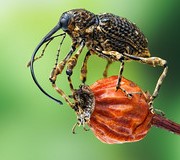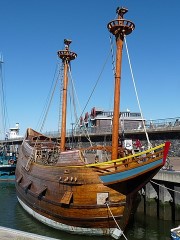|
Home
|
Apr 26, 2021
This week’s themeWords made with animal parts This week’s words rostrum carapace hackle pinnacle hightail 
How long is your rostrum? Probably not as long as this weevil’s.
Photo: André De Kesel 
A replica of Willem Barentsz’s ship in Harlingen, The Netherlands
Photo: Smiley.toerist / Wikimedia Previous week’s theme Nouning verbs and verbing nouns A.Word.A.Day
with Anu GargAround here we do not consume food with animal ingredients -- a plant-based diet works just fine.* We make an exception for words, however. This week we’ll feature five such words -- words made with animal parts. Sometimes it’s obvious. Sometimes not, and you’ll have to read the label for a word’s list of ingredients, also known as the etymology. We’ll go from head to tail, or at least from beak to tail. *If you are curious why, check out the documentary Dominion. rostrum
PRONUNCIATION:
MEANING:
noun: 1. A platform, stage, dais, etc., for public speaking. 2. A beaklike projection on a warship, used for ramming another ship. 3. A snout, beak, or bill of an animal. ETYMOLOGY:
In ancient Rome, a speaking platform was decorated with the beaks
of captured ships. Hence the use of the term for a speaking platform.
From Latin rostrum (snout, bill, beak), from rodere (to gnaw). Earliest
documented use: 1542.
USAGE:
“MPs blocked the parliament’s rostrum before the start of an extraordinary meeting.” Party of Regions Blocks Parliament Rostrum; Kyiv Post (Ukraine); Feb 3, 2010. See more usage examples of rostrum in Vocabulary.com’s dictionary. A THOUGHT FOR TODAY:
A new word is like a fresh seed sown on the ground of the discussion.
-Ludwig Wittgenstein, philosopher (26 Apr 1889-1951)
|
|
Subscriber Services
Awards | Stats | Links | Privacy Policy
Contribute | Advertise
Awards | Stats | Links | Privacy Policy
Contribute | Advertise
© 1994-2026 Wordsmith